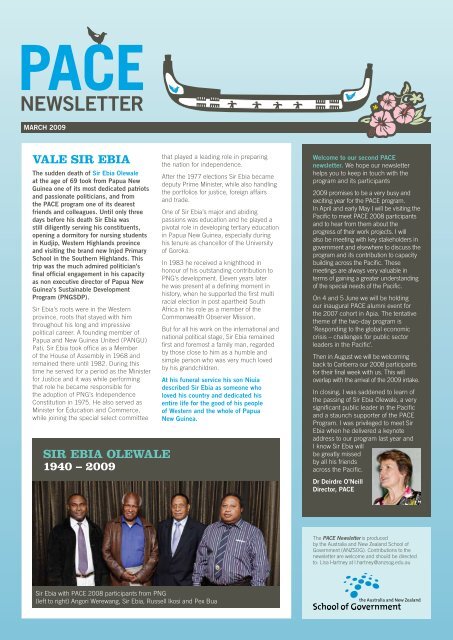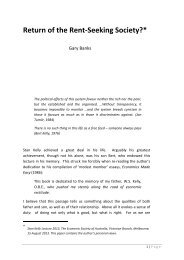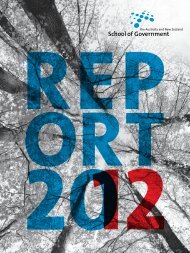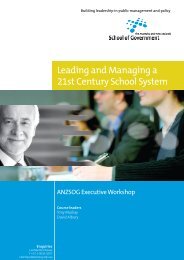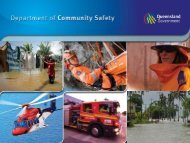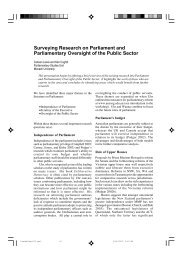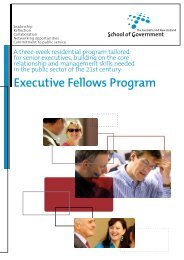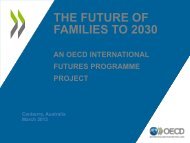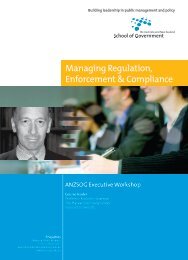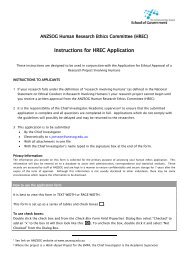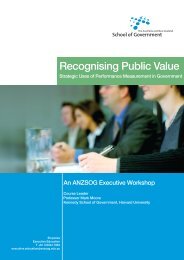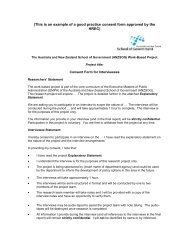Download - Australia and New Zealand School of Government
Download - Australia and New Zealand School of Government
Download - Australia and New Zealand School of Government
Create successful ePaper yourself
Turn your PDF publications into a flip-book with our unique Google optimized e-Paper software.
march 2009<br />
Vale sir ebia<br />
The sudden death <strong>of</strong> Sir Ebia Olewale<br />
at the age <strong>of</strong> 69 took from Papua <strong>New</strong><br />
Guinea one <strong>of</strong> its most dedicated patriots<br />
<strong>and</strong> passionate politicians, <strong>and</strong> from<br />
the PACE program one <strong>of</strong> its dearest<br />
friends <strong>and</strong> colleagues. Until only three<br />
days before his death Sir Ebia was<br />
still diligently serving his constituents,<br />
opening a dormitory for nursing students<br />
in Kudjip, Western Highl<strong>and</strong>s province<br />
<strong>and</strong> visiting the br<strong>and</strong> new Injed Primary<br />
<strong>School</strong> in the Southern Highl<strong>and</strong>s. This<br />
trip was the much admired politician’s<br />
final <strong>of</strong>ficial engagement in his capacity<br />
as non executive director <strong>of</strong> Papua <strong>New</strong><br />
Guinea’s Sustainable Development<br />
Program (PNGSDP).<br />
Sir Ebia’s roots were in the Western<br />
province, roots that stayed with him<br />
throughout his long <strong>and</strong> impressive<br />
political career. A founding member <strong>of</strong><br />
Papua <strong>and</strong> <strong>New</strong> Guinea United (PANGU)<br />
Pati, Sir Ebia took <strong>of</strong>fice as a Member<br />
<strong>of</strong> the House <strong>of</strong> Assembly in 1968 <strong>and</strong><br />
remained there until 1982. During this<br />
time he served for a period as the Minister<br />
for Justice <strong>and</strong> it was while performing<br />
that role he became responsible for<br />
the adoption <strong>of</strong> PNG’s Independence<br />
Constitution in 1975. He also served as<br />
Minister for Education <strong>and</strong> Commerce,<br />
while joining the special select committee<br />
Sir Ebia Olewale<br />
1940 – 2009<br />
that played a leading role in preparing<br />
the nation for independence.<br />
After the 1977 elections Sir Ebia became<br />
deputy Prime Minister, while also h<strong>and</strong>ling<br />
the portfolios for justice, foreign affairs<br />
<strong>and</strong> trade.<br />
One <strong>of</strong> Sir Ebia’s major <strong>and</strong> abiding<br />
passions was education <strong>and</strong> he played a<br />
pivotal role in developing tertiary education<br />
in Papua <strong>New</strong> Guinea, especially during<br />
his tenure as chancellor <strong>of</strong> the University<br />
<strong>of</strong> Goroka.<br />
In 1983 he received a knighthood in<br />
honour <strong>of</strong> his outst<strong>and</strong>ing contribution to<br />
PNG’s development. Eleven years later<br />
he was present at a defining moment in<br />
history, when he supported the first multi<br />
racial election in post apartheid South<br />
Africa in his role as a member <strong>of</strong> the<br />
Commonwealth Observer Mission.<br />
But for all his work on the international <strong>and</strong><br />
national political stage, Sir Ebia remained<br />
first <strong>and</strong> foremost a family man, regarded<br />
by those close to him as a humble <strong>and</strong><br />
simple person who was very much loved<br />
by his gr<strong>and</strong>children.<br />
At his funeral service his son Niuia<br />
described Sir Ebia as someone who<br />
loved his country <strong>and</strong> dedicated his<br />
entire life for the good <strong>of</strong> his people<br />
<strong>of</strong> Western <strong>and</strong> the whole <strong>of</strong> Papua<br />
<strong>New</strong> Guinea.<br />
Welcome to our second PACE<br />
newsletter. We hope our newsletter<br />
helps you to keep in touch with the<br />
program <strong>and</strong> its participants<br />
2009 promises to be a very busy <strong>and</strong><br />
exciting year for the PACE program.<br />
In April <strong>and</strong> early May I will be visiting the<br />
Pacific to meet PACE 2008 participants<br />
<strong>and</strong> to hear from them about the<br />
progress <strong>of</strong> their work projects. I will<br />
also be meeting with key stakeholders in<br />
government <strong>and</strong> elsewhere to discuss the<br />
program <strong>and</strong> its contribution to capacity<br />
building across the Pacific. These<br />
meetings are always very valuable in<br />
terms <strong>of</strong> gaining a greater underst<strong>and</strong>ing<br />
<strong>of</strong> the special needs <strong>of</strong> the Pacific.<br />
On 4 <strong>and</strong> 5 June we will be holding<br />
our inaugural PACE alumni event for<br />
the 2007 cohort in Apia. The tentative<br />
theme <strong>of</strong> the two-day program is<br />
‘Responding to the global economic<br />
crisis – challenges for public sector<br />
leaders in the Pacific’.<br />
Then in August we will be welcoming<br />
back to Canberra our 2008 participants<br />
for their final week with us. This will<br />
overlap with the arrival <strong>of</strong> the 2009 intake.<br />
In closing, I was saddened to learn <strong>of</strong><br />
the passing <strong>of</strong> Sir Ebia Olewale, a very<br />
significant public leader in the Pacific<br />
<strong>and</strong> a staunch supporter <strong>of</strong> the PACE<br />
Program. I was privileged to meet Sir<br />
Ebia when he delivered a keynote<br />
address to our program last year <strong>and</strong><br />
I know Sir Ebia will<br />
be greatly missed<br />
by all his friends<br />
across the Pacific.<br />
Dr Deirdre O’Neill<br />
Director, PACE<br />
The PACE <strong>New</strong>sletter is produced<br />
by the <strong>Australia</strong> <strong>and</strong> <strong>New</strong> Zeal<strong>and</strong> <strong>School</strong> <strong>of</strong><br />
<strong>Government</strong> (ANZSOG). Contributions to the<br />
newsletter are welcome <strong>and</strong> should be directed<br />
to: Lisa Hartney at l.hartney@anzsog.edu.au<br />
Sir Ebia with PACE 2008 participants from PNG<br />
(left to right) Angori Werewang, Sir Ebia, Russell Ikosi <strong>and</strong> Pex Bua
A different<br />
perspective<br />
Pr<strong>of</strong>essor Vijay Naidu from the University<br />
<strong>of</strong> the South Pacific (USP) had a very<br />
particular experience <strong>of</strong> Stage 1 <strong>of</strong> the<br />
PACE Program in 2008 – unlike most <strong>of</strong><br />
those lecturing during the course, he was<br />
lucky enough to know how it feels to be<br />
both presenter <strong>and</strong> participant. Having<br />
delivered an address in 2007, he was<br />
IMAGE<br />
VIJAY<br />
delighted to be invited back in 2008 to<br />
present a talk on the topic ‘Managing<br />
Relationships with Ministers’, but he was<br />
also especially gratified to be given the<br />
opportunity to join the other members <strong>of</strong> the<br />
group as the Pacific Scholar in Residence<br />
for the first week <strong>of</strong> the program.<br />
Currently the Director <strong>of</strong> Development<br />
Studies <strong>and</strong> the Acting Executive Director<br />
<strong>of</strong> the Pacific Institute <strong>of</strong> Advanced Studies<br />
in Development <strong>and</strong> Governance at USP in<br />
Fiji, Pr<strong>of</strong>essor Naidu is an expert on such<br />
disparate topics as aid, migration, ethnicity,<br />
higher education, electoral politics, l<strong>and</strong><br />
tenure, the state, poverty, civil society <strong>and</strong><br />
human security – having researched <strong>and</strong><br />
written on all <strong>of</strong> these areas.<br />
In 2008 Pr<strong>of</strong>essor Naidu’s sessions followed<br />
those conducted by Canberra’s Barbara<br />
Belcher, the First Assistant Secretary in the<br />
<strong>Government</strong> Division <strong>of</strong> the Prime Minister <strong>and</strong><br />
Cabinet. The IMAGE juxtaposition pleased Pr<strong>of</strong>essor<br />
Naidu, as VIJAY he appreciated SCHOOL the opportunity<br />
PACE provided for the participants to listen<br />
to the viewpoints <strong>of</strong> both practitioners like<br />
Ms Belcher <strong>and</strong> academics like him. “I think<br />
it’s a marvellous arrangement,” he says.<br />
“Barbara is very much h<strong>and</strong>s-on <strong>and</strong> you<br />
couldn’t find a better person in public service.”<br />
He is keen to point out how the two<br />
presentations side by side were particularly<br />
useful for the audience. First they listened<br />
to the everyday practicalities <strong>of</strong> the balancing<br />
acts carried out by public servants working<br />
with government ministers, as outlined<br />
by Ms Belcher. Then they received a<br />
more removed analysis from Pr<strong>of</strong>essor<br />
Naidu himself.<br />
“‘I think the people in the room identify<br />
with a lot <strong>of</strong> those issues. They see the<br />
shortcomings <strong>of</strong> their systems back home,”<br />
he says. “And then I come along <strong>and</strong><br />
crystallise some <strong>of</strong> those issues. And I have<br />
the benefit <strong>of</strong> listening to Barbara before.<br />
And also the benefit <strong>of</strong> just observing <strong>and</strong><br />
reading about it – having that detachment.<br />
“Barbara gives a very positive image <strong>of</strong> the<br />
public service,” he continues, “but the issues<br />
in the region relate to the organisation, its<br />
culture <strong>and</strong> the system’s nature. I think that’s<br />
the contrast.”<br />
With so many different countries<br />
represented by the participants in PACE,<br />
Pr<strong>of</strong>essor Naidu notes that he has an<br />
advantage over many <strong>of</strong> the speakers. And<br />
not just because <strong>of</strong> his previous experience<br />
with the program <strong>and</strong> his extended<br />
participation this year. He also underst<strong>and</strong>s<br />
the group’s concerns because he comes<br />
from the region himself. And he is able to<br />
use Fiji as an example when talking about<br />
the particular problems <strong>of</strong> government in<br />
developing countries <strong>and</strong> states.<br />
Was the PACE<br />
Program useful<br />
to you?<br />
GEROLLYN TAGARO<br />
from VANUATU<br />
Yes. I was recently promoted to Human<br />
Resource Officer, which is a new area<br />
for me. At the beginning <strong>of</strong> the year I<br />
was out working in the field <strong>and</strong> had<br />
some difficulties, but then I recalled<br />
some <strong>of</strong> the things taught in this<br />
program <strong>and</strong> it really helped me.<br />
TULI FEPULEAI SAMUELU<br />
from SAMOA<br />
I never thought that I’d be able to assist<br />
the Ministry in the development <strong>of</strong> the<br />
performance management system (which<br />
is what I did my project on) but the<br />
opportunity <strong>and</strong> the challenge provided<br />
by the course made it possible. It also<br />
helped me extract what I can contribute<br />
to the Ministry <strong>and</strong> to the development <strong>of</strong><br />
my country. The highlights <strong>of</strong> the program<br />
were the sharing <strong>of</strong> ideas, the networks,<br />
the building <strong>of</strong> alliances, <strong>and</strong> just being<br />
in this group <strong>of</strong> different leaders from the<br />
Pacific, which I found really encouraging.<br />
TIMOCI NAMOTU<br />
from Fiji<br />
One <strong>of</strong> the benefits <strong>of</strong> the PACE<br />
Program is that it gives you an<br />
opportunity to talk <strong>and</strong> mix with others<br />
from the Pacific, who are on the same<br />
level on the public service ladder in<br />
their countries. And so with important<br />
governance issues like policy-making<br />
<strong>and</strong> policy writing we can learn from<br />
each other. Just hearing about other<br />
governments’ issues <strong>and</strong> how they<br />
deal with them has been really<br />
useful for me.
“Talking at the level that I do <strong>and</strong> giving<br />
some examples, especially from my own<br />
country, does not make them feel we have<br />
used their particular country. You have<br />
to do these things with some sensitivity,<br />
without naming names.”<br />
Pr<strong>of</strong>essor Naidu is full <strong>of</strong> praise for PACE,<br />
noting the invaluable opportunities it gives<br />
to public servants from developing nations<br />
to watch <strong>and</strong> learn how things are done<br />
in <strong>Australia</strong> before going home full <strong>of</strong> new<br />
ideas <strong>and</strong> practical suggestions. “This is<br />
what the PACE program does,” he says. “It<br />
brings together senior public servants from<br />
the region <strong>and</strong> this is an occasion for them<br />
to learn about broader principles <strong>and</strong> case<br />
studies in public service <strong>and</strong> the reform <strong>of</strong><br />
public service.”<br />
During last year’s program the group made<br />
a visit to the <strong>Australia</strong>n Parliament – a trip<br />
that surprised many, as they witnessed<br />
a particularly rambunctious session <strong>of</strong><br />
<strong>Australia</strong>n parliamentary debate.<br />
“Seeing the <strong>Australia</strong>n Parliament, they can<br />
see the traditions, the heckles – the word to<br />
use is robust,” says Pr<strong>of</strong>essor Naidu, though<br />
he is quick to point out that such rowdiness<br />
would be unthinkable in many Pacific<br />
counterparts. “Unfortunately the culture<br />
<strong>of</strong> these societies also impedes political<br />
discussion,” he says.<br />
But the nature <strong>of</strong> the PACE program fosters<br />
co-operation <strong>and</strong> the sharing <strong>of</strong> ideas.<br />
“Students are able to work through problems<br />
together,” he says, referring to an idea that<br />
was aired during the question-<strong>and</strong>-answer<br />
session after his presentation.<br />
“That suggestion that things should be in<br />
writing, that’s something that’s permeated<br />
to the group as a whole. It’s a work <strong>of</strong> learning<br />
<strong>and</strong> I learn from them in that situation <strong>and</strong><br />
I learn from the other presenters.”<br />
With his vast experience <strong>and</strong> underst<strong>and</strong>ing<br />
<strong>of</strong> the history <strong>and</strong> application <strong>of</strong> politics, has<br />
he ever considered making the transition<br />
himself? And become a practitioner instead<br />
<strong>of</strong> an academic?<br />
“I’ve been approached,” he admits.<br />
“Colleagues <strong>of</strong> mine have succumbed to<br />
the seduction <strong>of</strong> politics <strong>and</strong> I must say I’ve<br />
been tempted. But I’ve got a family that is<br />
strongly opposed to my being a politician.<br />
So I’ve been tempted, but thank goodness<br />
good sense has prevailed.<br />
“I now feel that there is a place for<br />
scholars that are not there pushing a<br />
party line; we are kind <strong>of</strong> apolitical beings.<br />
There are particular issues that we engage<br />
with – in that sense we are political <strong>and</strong> we<br />
are able to contribute, but we are a small<br />
isl<strong>and</strong> state <strong>and</strong> as soon as you get involved<br />
with a party, you are labelled forever.”<br />
And besides, someone has to keep their<br />
eye on the bigger picture away from what<br />
he describes as the “hustle <strong>and</strong> bustle <strong>of</strong><br />
mainstream politics”. He talks <strong>of</strong> academic<br />
colleagues who specialised in economics, but<br />
IMAGE<br />
VIJAY SCHOOL<br />
got caught up in the practical applications <strong>and</strong><br />
it affected their careers. It’s not for him. “We<br />
don’t have enough researchers who take up<br />
the challenge <strong>of</strong> contributing to the nation in<br />
other ways,” he concludes.<br />
some dates<br />
for your<br />
calendar<br />
1 2 3 4 5<br />
6 7 8 9 10 11 12<br />
13 14 15 16 17 18 19<br />
20 21 22 23 24 25 26<br />
27 28 29 30<br />
Late april – Early May<br />
In-country meetings with 2008 PACE<br />
participants<br />
29 May, 2009<br />
2009<br />
PACE 2008 – Final report on work<br />
project due<br />
end May, 2009<br />
PACE 2009 – Applications to be<br />
submitted to AusAid posts<br />
4 to 5 June, 2009<br />
Inaugural PACE alumni event (Apia)<br />
18 to 24 August, 2009<br />
PACE 2008 – Stage 3 (Canberra)<br />
24 August to<br />
10 September, 2009<br />
PACE 2009 – Stage 1 (Canbarra)<br />
Keeping<br />
it in the<br />
family<br />
There was a lovely surprise for Hilda Lini<br />
when she arrived to present “The Public<br />
Manager <strong>and</strong> Civil Society” at the 2008<br />
PACE program last September. Hilda is a<br />
chief <strong>of</strong> the Turaga nation <strong>of</strong> Pentecost<br />
Isl<strong>and</strong> in Vanuatu <strong>and</strong> she was delighted<br />
to find that not one, but two <strong>of</strong> her nieces<br />
were also present as participants in the<br />
program. Kayleen Tavoa is Vanuatu’s<br />
public prosecutor <strong>and</strong> Irene Titek is the<br />
Human Resources Manager in Vanuatu’s<br />
Ministry <strong>of</strong> Health. As well as joining the<br />
second cohort <strong>of</strong> the PACE program,<br />
Irene was also one <strong>of</strong> the three worthy<br />
recipients <strong>of</strong> the Pacific Isl<strong>and</strong>s<br />
Scholarship for Governance.<br />
Family ties (left to right) Kayleen Tavoa, Hilda Lini <strong>and</strong> Irene Titek<br />
The three women are pictured here at an<br />
informal dinner held at the Turkish Pide<br />
House restaurant in Canberra on Monday<br />
8 September during the final week <strong>of</strong><br />
the program.<br />
This is clearly one high achieving family, <strong>and</strong><br />
Hilda must certainly be a great inspiration<br />
to her younger relatives. Among her many<br />
achievements <strong>and</strong> accomplishments are<br />
serving as the only female member <strong>of</strong><br />
Parliament in Vanuatu from 1987 to 1998.<br />
While in <strong>of</strong>fice she served as the Minister<br />
for Justice, the Minister for Health <strong>and</strong> the<br />
Foreign Minister.<br />
After public service Hilda became the director<br />
<strong>of</strong> the Pacific Concerns Resource centre <strong>and</strong><br />
was selected to be the Representative <strong>of</strong> the<br />
Pacific Region at the UN Non-proliferation<br />
Review Conference. And, as if that wasn’t all<br />
enough, in 2005 she was even nominated for<br />
the Nobel Peace Prize, thanks to her tireless<br />
efforts as an advocate for peace <strong>and</strong> nuclear<br />
disarmament in the Pacific.
Keeping your<br />
team on track<br />
Here’s the scenario: you are leading a<br />
team on a big project, something that will<br />
take a long time to implement but will have<br />
enormous ramifications for the community.<br />
There is great pressure coming from the<br />
government, who is expecting a good<br />
outcome. Plus you have to deliver on time,<br />
on budget. How do you make sure that<br />
you can keep all your team enthusiastic<br />
<strong>and</strong> focused on the project so that you<br />
can achieve the right results?<br />
By applying the art <strong>of</strong> leadership, says<br />
Pr<strong>of</strong>essor Nita Cherry, <strong>of</strong> Swinburne<br />
University <strong>of</strong> Technology in Melbourne<br />
<strong>and</strong> one <strong>of</strong> the key presenters at the<br />
PACE program.<br />
A good leader knows what makes people<br />
tick in order to motivate <strong>and</strong> energise them.<br />
Who are the practical ones, who are the ‘big<br />
picture’ people, <strong>and</strong> who likes to have solid,<br />
clear directions laid out for them? “You need<br />
to underst<strong>and</strong> that people like to do what<br />
comes easily to them or, in other words,<br />
their natural preferences,”she says. And<br />
that involves knowing different personality<br />
types <strong>and</strong> creating an environment where<br />
they can flourish.<br />
If you are dealing with naturally creative<br />
staff, for example, the worst thing to do<br />
is to drain their energy by giving them<br />
six months repetitious work with plenty<br />
<strong>of</strong> detail <strong>and</strong> administration. “That will<br />
make them seriously barmy,” laughs Nita.<br />
“Instead, find some ways that they can<br />
remain innovative in their approach to<br />
the work.”<br />
“This might mean that you have to vary<br />
the routines a bit, or explore how they can<br />
work in different physical environments,<br />
or talk with different people about the work<br />
that they’re doing,” she says. “Anything that<br />
varies the routine will help them stay in the<br />
space <strong>and</strong> not go crazy, <strong>and</strong> ensure they<br />
stay creative <strong>and</strong> engaged.”<br />
Keep an eye out for exhaustion or burn-out<br />
too. Projects can <strong>of</strong>ten go awry when a team<br />
starts <strong>of</strong>f enthusiastically, but ends up losing<br />
their way. “Be careful that they don’t expend<br />
all their energy at the front end <strong>and</strong> then<br />
have little energy left for the hard parts <strong>of</strong><br />
the project that come later,” cautions Nita.<br />
Is it possible to be a good leader <strong>and</strong> not<br />
underst<strong>and</strong> people? Not according to our<br />
expert. “I make the distinction between<br />
leadership <strong>and</strong> management,” she says.<br />
“Managers deal with things, but leaders<br />
deal with people. If you really don’t<br />
underst<strong>and</strong> what’s going on, then you<br />
shouldn’t be surprised when the people<br />
turn on you or don’t respond to you.”<br />
“I make the distinction<br />
between leadership <strong>and</strong><br />
management... Managers<br />
deal with things, but leaders<br />
deal with people.”<br />
A wise leader needs to be insightful <strong>and</strong><br />
stage manage the work. “Put yourself in<br />
their shoes <strong>and</strong> think what can be done<br />
when it gets tough, in order to help people<br />
through the hard part,” Nita advises.<br />
One more kernel <strong>of</strong> advice from Nita:<br />
nothing strips a team’s confidence quicker<br />
than an overwrought leader. In other words,<br />
do not dump your own anxiety on the group.<br />
“If the team is already feeling that something<br />
is hard going, then the last thing they need<br />
is to be around a leader who is robbing them<br />
<strong>of</strong> energy by the way they are behaving,”<br />
Nita says.<br />
An <strong>Australia</strong>n <strong>Government</strong>, AusAID initiative<br />
The Pace Program is delivered by the <strong>Australia</strong><br />
<strong>and</strong> <strong>New</strong> Zeal<strong>and</strong> <strong>School</strong> <strong>of</strong> <strong>Government</strong>.<br />
FSC logo<br />
Monza Recycled contains 55% recycled<br />
fibre (25% post consumer <strong>and</strong> 30% pre<br />
consumer) <strong>and</strong> FSC Certified pulp, which<br />
ensures that all virgin pulp is derived from<br />
well-managed forests <strong>and</strong> controlled<br />
sources. It is manufactured by an ISO<br />
14001 certified mill. Monza Recycled is<br />
an FSC Mixed Sources Certified paper.


